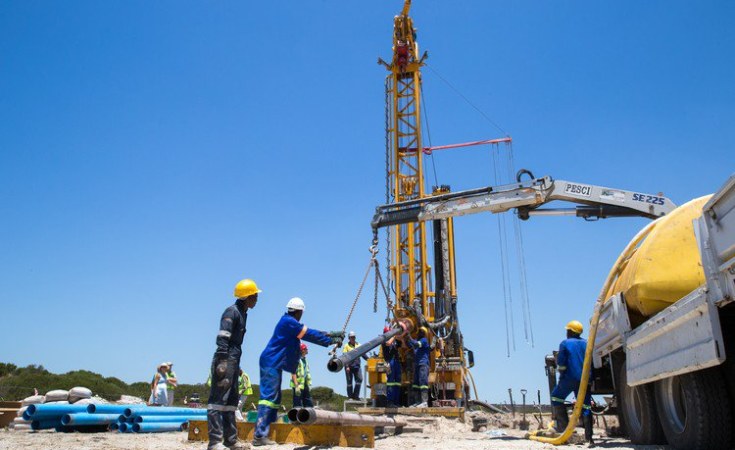New York — As world leaders prepare to attend the historic UN Water Conference, UNICEF calls for urgent investment in climate-resilient water, sanitation, and hygiene (WASH) services to protect children
190 million children in 10 African countries are at the highest risk from a convergence of three water-related threats - inadequate water, sanitation, and hygiene (WASH); related diseases; and climate hazards - according to a new UNICEF analysis.
The triple threat was found to be most acute in Benin, Burkina Faso, Cameroon, Chad, Côte d'Ivoire, Guinea, Mali, Niger, Nigeria, and Somalia, making West and Central Africa one of the world's most water-insecure and climate-impacted regions, according to the analysis. Many of the worst-affected countries, particularly in the Sahel, are also facing instability and armed conflict, further aggravating children's access to clean water and sanitation.
"Africa is facing a water catastrophe. While climate and water-related shocks are escalating globally, nowhere else in the world do the risks compound as severely for children," said UNICEF Director of Programmes Sanjay Wijesekera. "Devastating storms, floods, and historic droughts are already destroying facilities and homes, contaminating water resources, creating hunger crises, and spreading disease. But as challenging as the current conditions are, without urgent action, the future could be much more bleak."
The global analysis - which reviewed household access to WASH services, the burden of WASH-attributable deaths among children under five, and exposure to climate and environmental hazards - reveals where children face the biggest threat and where investment in solutions is desperately needed to prevent unnecessary deaths.
Across the 10 hotspots, nearly one-third of children do not have access to at least basic water at home, and two-thirds do not have basic sanitation services. A quarter of children have no choice but to practise open defecation. Hand hygiene is also limited, with three-quarters of children unable to wash their hands because of lack of water and soap at home.
As a result, these countries also carry the heaviest burden of child deaths from diseases caused by inadequate WASH, such as diarrhoeal diseases. For example, 6 of the 10 have faced cholera outbreaks over the past year. Globally, more than 1,000 children under five die every day from WASH-related diseases, with around 2 out of 5 concentrated in these 10 countries alone.
These hotspots also rank within the top 25 per cent of 163 countries globally with the highest risk of exposure to climate and environmental threats. Higher temperatures - which accelerate pathogen replication - are increasing 1.5 times faster than the global average in parts of West and Central Africa. Groundwater levels are also dropping, requiring some communities to dig wells twice as deep as just a decade ago. At the same time, rainfall has become more erratic and intense, leading to floods that contaminate scarce water supplies.
All 10 hotspot countries are also classified by OECD as fragile or extremely fragile, with the stresses of armed conflict in some countries threatening to reverse progress toward safe water and sanitation. For example, Burkina Faso has seen a ramping up of attacks on water facilities as a tactic to displace communities. Fifty-eight water points were attacked in 2022, up from 21 in 2021, and three in 2020. As a result, more than 830,000 people - over half of whom are children - lost access to safe drinking water in the last year.
The new analysis comes ahead of the UN 2023 Water Conference taking place in New York from 22-24 March. World leaders, relevant organizations and other participants will convene for the first time in 46 years to review progress toward ensuring access to water and sanitation for all. At the conference, UNICEF is calling for:
Rapid scale-up of investment in the sector, including from global climate financing.
Strengthening climate resilience in the WASH sector and communities.
Prioritizing the most vulnerable communities in WASH programmes and policies.
Increasing effective and accountable systems, coordination and capacities to provide water and sanitation services.
Implementing the UN-Water SDG6 Global Acceleration Framework and investing in the key accelerators.
"The loss of a child's life is shattering for families. But the pain is intensified when it is preventable and caused by the lack of basic necessities many take for granted like safe drinking water, toilets, and soap," said Wijesekera. "Investing in climate-resilient water, sanitation, and hygiene services is not only a matter of protecting children's health today, but also ensuring a sustainable future for generations to come."
###
Notes to editors
The 'triple threat' or 'triple burden' is defined in this brief as less than 50 per cent access to at least basic water or sanitation services; within the top 20 countries with the highest burden of deaths attributable to unsafe WASH among children under 5; and the top 25 per cent of countries facing the highest risk of climate and environmental hazards
The analysis is based on a composite of data pulled from three sources:
WHO/UNICEF Joint Monitoring Programme: Progress on household drinking water, sanitation and hygiene 2000-2020: five years into the SDGs
WHO: Deaths by Cause, Age, Sex, by Country and by Region, 2000-2019
UNICEF: The Climate Crisis is a Child Rights Crisis: Introducing The Children's Climate Risk Index


